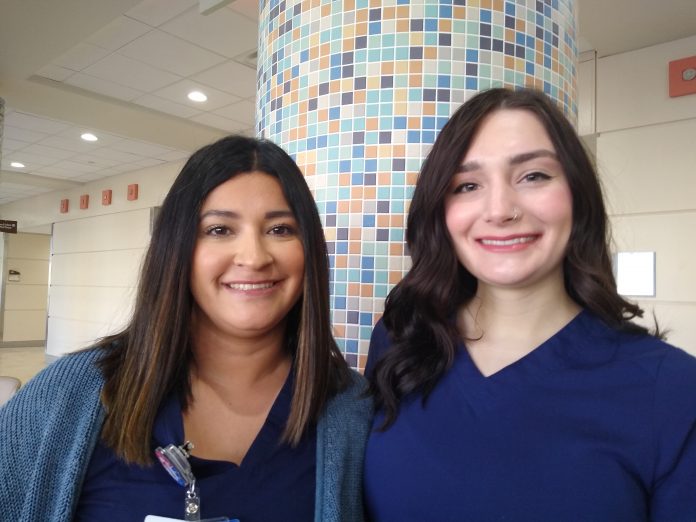A U.S. Health and Human Services study details Texas is ranked near the top when it comes to the country’s nursing shortage and by 2030 the state will fall roughly 16,000 nurses shy of meeting the anticipated demand. Federal officials believe only California will rank worse, falling 44,500 shy of the anticipated demand.
Two Medical Center Hospital nurses, who are celebrating National Nurses Week this week, said they can’t imagine any other profession.
Yolanda Rios started at MCH seven years ago as a certified nurses assistant and became a registered nurse just months before COVID-19 hit. When she was hired, she was looking for a way to support her family, but ended up falling in love with the profession.
Even though she had tough moments during the height of the pandemic, thinking about bringing the virus home to her family, the emergency room nurse said she felt supported and loved by her colleagues.
“We were all a team together. We all got each other through it. We were all feeling the same emotions at the same time, but it didn’t feel like I was alone in that moment,” Rios said. “I had support through it and so it didn’t break me as a nurse. It made me stronger.”
She also felt supported by her patients.
“The patients saw that we were willing to risk our lives, essentially, to protect them, to take care of them and so they were thankful,” Rios said.
Nursing while wearing masks hasn’t been easy, though, she said.
“It’s hard. When you’re looking at a patient and you’re like, ‘I’m going to give you these medicines and I’m going to take care of you.’ They can’t even see your face, they only see your eyes,” Rios said. “How do you gain their trust when they can’t even see who was taking care of them? (Some of them) don’t have families. So you’re like, ‘Can I call anyone?’ When they don’t it’s very sad. What do you do at that moment? You be their family.”
Even now some of those patients come back to the hospital and remember their names, she said.
Nicole Strickland was still in nursing school at Midland College when the pandemic hit, but she never considered changing course. Her father is a doctor and her grandmother is a nurse and she’s always felt “called to serve.”
The intensive care unit nurse worked as a tech in the emergency room for a few years and spent a year as a nursing intern. She became a registered nurse exactly one year ago.
“I’m so grateful for my time in the ER, but in the ICU, there’s so much to learn and it is difficult. Every day is a challenge, you learn something new every day. You can work in ICU for 20 years and never learn everything that there is to know about ICU nursing and that’s what I love about it,” Strickland said. “There’s so much that’s changing about it. Every day we come up with new studies, new evidence-based practice for us to follow. It’s difficult, but I love it how difficult it is.”
Some days are tougher than others, but she’s never imagined giving up the profession, she said.
“I come home crying (sometimes). I have a lot of compassion for my patients and it’s hard, but then I think to myself. It’s like I know that I’ve provided the best care to the family and to the patient and I want to come back the next day and keep providing that care,” Strickland said. “If they can one day look and say ‘You know when my father was dying, that Nurse Nicole really helped me through this time, I don’t think I could have done without her.’ That’s enough for me to come to work every day.”




